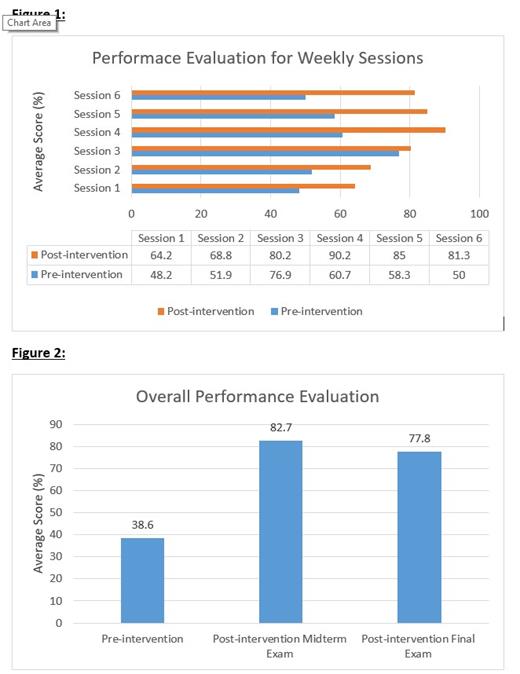Abstract
Introduction:
Hematologic malignancy is a complex science that requires the integration of numerous advanced pathology techniques, including flow cytometry, genomic analysis, and molecular diagnostics, for diagnosis and risk stratification to guide management plans and optimize patient care.
Understanding the methodology and proper utilization of new laboratory test methodologies relevant to patient care are required competencies for graduating hematology/oncology trainees, put forth by the Accreditation Council for Graduate Medical Education (ACGME). Therefore, these competencies are heavily tested on specialty board certification exams.
We aimed at familiarizing our trainees with distinct laboratory test methodologies, and classifications of hematologic neoplasms from a hematopathologist's perspective. Simplifying such a complex science is a potential way to help trainees conceptualize the proper uses of several diagnostic tests. A shared understanding of clinical and pathologic approaches to hematologic malignancies will lead to improved advanced knowledge in the field, test-taking capabilities and reflect on patient care.
We hypothesized that delivering cross-discipline training will improve the level of knowledge for our trainees, and reflect on the hematology in-training-exam scores and subsequently improve the American board of hematology participation and pass rates.
Method:
Curriculum Description:
We developed a cross-discipline curriculum, three-month experience that included rigorous training in advanced hematopathology focused on hematologic malignancies. The curriculum included two hours per week, hybrid style interactive sessions --online/in-person classes--. A self-directed component included pre-class readings and pre- and post-weekly quizzes. The in-person sessions included interactive, case-based seminars guided by cross-discipline faculty members. Instructors for the curriculum included a malignant hematologist and a hematopathologist.
The enrollment to the described curriculum made available for all hematology-oncology fellows, internal medicine residents, and advanced practice providers (APPs). This project was accomplished as part of the ASH Medical Educator Institute.
Evaluation plan:
Trainees were given pre- and post-intervention case-based exams as well as pre- and post-quizzes every week, to assess their knowledge and level of progression. For hematology fellows, trainee's performance on in-training exams (ITEs) was also compared to a historical control group of trainees from the same program.
Results:
The training included twenty-six participants, eight hematology-oncology fellows, five medical residents, six APPs, and seven faculty. Faculty participants were excluded from the performance evaluation to avoid bias introduction. Pre-class surveys and quizzes were collected to measure baseline knowledge of different hematology subjects and to guide the focus of the training based on common weaknesses amongst a majority of participants.
Eighty-six percent of participants elected to attend the training to improve their clinical practice experience and exam scores, the rest intended to network academically. Before each session, participants finished the pre-session quizzes that was compared to the post-session quizzes. We report the persistent positive impact of the sessions on the trainees' weekly performances. We measured the overall impact of the training, comparing the pre-intervention exam with midterm and final exam scores, which also significantly increased compared to pre-intervention scores. (Figures 1 & 2)
For hematology Oncology trainees, we also measured the impact of this training on their in-training-exam scores, compared to historical controls from the same fellowship program. For the hematology in-training exam scores, we noticed a significant improvement after the intervention for the year 2021 compared to the year 2020. An increase in the program means score, which reflected on the program overall performance with an increase in our percentile rank by approximately 14 points.
Conclusion:
Developing a cross-discipline interactive training curriculum is an innovative method to enhance the hematology-oncology trainees' experience. It promoted their level of knowledge and improved exam skills, which is reflected in the annual in-training exam scores.
Ellis: Rafael Pharmaceuticals: Consultancy.


This feature is available to Subscribers Only
Sign In or Create an Account Close Modal